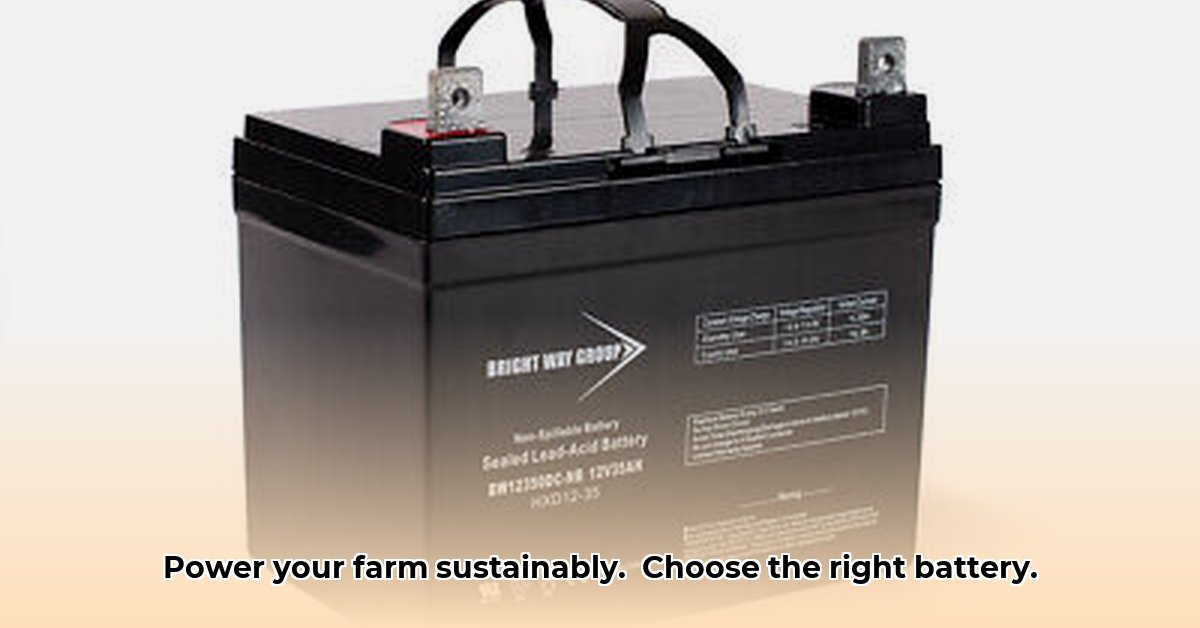
The shift towards sustainable agriculture is driving a growing demand for electric farm equipment. A crucial component of this transition is selecting the right battery for your electric garden tractor. This guide compares lead-acid and lithium-ion 12V batteries, helping you make an informed decision that balances performance, cost, and environmental responsibility. For more information on battery sizes, check out this helpful chart.
Understanding 12V Batteries for Garden Tractors
Before choosing a battery, understand your tractor's power needs. How long will your tractor run per day? What tasks will it perform? This helps determine the required amp-hour (Ah) rating – the measure of a battery's energy storage capacity (higher Ah = longer runtime). Cold Cranking Amps (CCA) – a measure of the battery's ability to deliver high current for starting – is another critical factor, especially in cold climates.
Lead-Acid vs. Lithium-Ion: A Detailed Comparison
This section directly addresses the core question: How to choose the best sustainable battery for electric farm equipment? The comparison below highlights key differences between the two main 12V battery types.
| Feature | Lead-Acid | Lithium-Ion |
|---|---|---|
| Initial Cost | Lower (Price range: $30-$150) | Higher (Price range: $150-$500+) |
| Lifespan | Shorter (2-3 years) | Longer (5-7+ years) |
| Maintenance | Higher (Regular fluid level checks, occasional recharging) | Minimal (Primarily charging) |
| Energy Density | Lower | Higher (More runtime per size/weight) |
| Environmental Impact | Higher (Lead production, acid disposal) | Lower (If responsibly sourced and recycled) |
| Weight & Dimensions | Heavier, larger | Lighter, often more compact |
| Safety Considerations | Risk of acid leaks and corrosion; handle carefully | Potential fire hazard if damaged; use a compatible charger |
Lead-Acid Batteries: The Established Choice
Lead-acid batteries are a familiar, readily available, and relatively inexpensive option. Their well-understood technology makes them easy to maintain. However, their shorter lifespan and regular maintenance needs can increase long-term costs. "Regular maintenance – including water topping – is crucial for extending the life of a lead-acid battery," explains Dr. Emily Carter, Agricultural Engineer, University of California, Davis.
Lithium-Ion Batteries: The Modern Advantage
Lithium-ion batteries offer a compelling alternative. Their higher energy density provides longer runtimes, and their lighter weight improves tractor maneuverability. While the initial purchase price is higher, the prolonged lifespan and reduced maintenance often lead to lower overall costs over time. However, they require specific chargers and careful handling.
Beyond Battery Specs: Crucial Considerations
Choosing the right battery involves more than just technical specifications. Consider these factors:
- Climate: Extreme temperatures negatively affect battery performance and lifespan.
- Usage Frequency: Daily use necessitates a durable battery, even if it costs more upfront.
- Budget: Evaluate initial cost against long-term maintenance and replacement expenses.
- Charging Access: Ensure convenient access to a reliable charging source.
Responsible Battery Disposal and Recycling
Proper disposal and recycling are critical for both battery types. Lead-acid batteries contain hazardous materials, requiring special handling at designated recycling centers. Responsible lithium-ion battery recycling minimizes environmental impact and recovers valuable resources. Contact your local waste management authority for guidance.
Conclusion: Choosing the Right Battery for Your Needs
The "best" 12V battery depends on your specific farming operation and priorities. For occasional garden work, a lead-acid battery might suffice. For frequent, demanding use, the higher upfront cost of a lithium-ion battery is often justified by its increased longevity and reduced maintenance. Remember to factor in the total cost of ownership, including initial purchase, maintenance, and eventual replacement costs, to make the most informed decision for your sustainable farm. Prioritizing responsible disposal and recycling practices completes the environmentally conscious approach to powering your electric garden tractor.